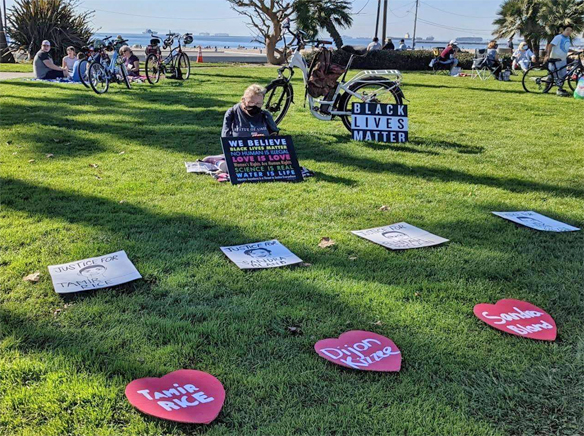
It is a new year after a summer of movement. A new President Elected. Hope abounds. Yet, every day still at noon, on the lawn by the pier, one will usually see at least two of the Black Lives Matter in Seal Beach group members kneeling in silence for 8 minutes and 46 seconds – the time it took for George Floyd to take his last agonizing breath. “I can’t breathe.” Signs with names of the murdered, signs of love and support for Black lives are held by the devout crew. Why? Why every day do they still do this? Their President won. BLM is up for a Nobel Peace Prize, so why still do it?
On a busy day at the grocery store, masked residents grabbed groceries for the recent holiday. Chatter, continuous beeping from the cash register, I waited in line behind the plexiglass as the cashier scanned my food items. It was just the two of us, when approached a beautiful woman. Long, curly hair, casually dressed, but lovely.
“They’re following me,” she said to the cashier and to me. “The employees, they’re following me around the store. I don’t steal.” A look of frustration crossed her beautiful ebony colored face. The employee said nothing as I told her that she should complain. “It’s okay”. “No, it’s not okay,” I exclaimed, “You should not be followed around the store and made to feel like a criminal. This is never okay, and it’s not going to be tolerated anymore. If you don’t want to complain, I will do it for you. They need to know that this is going on in their store.”
I did end up speaking with the manager and so did she. Just a few weeks before, I watched a video from another local Black woman who expressed her pain and hurt caused by a different grocery store accusing their child of stealing. She spoke of being surrounded by people watching the incident and not a single person spoke up against what was happening, or to offer help. It was because of this video that I spoke up for the woman being followed in the store on that day.
From 1966 to 1968 my grandparents, John and Gwen McCants, Seal Beach residents for forty plus years, natives to Hollywood and San Pedro, who raised their eleven children in our town, were members of the Fair Housing Act movement in Orange County. Gwen was the Secretary of the Fair Housing Committee during that time. The Fair Housing Act had passed earlier, but then was voted against in Prop 14 by California homeowners that feared that the value of their homes would be lowered by allowing non-white residents in.
Gwen recalled; “There were no black families in Seal Beach plain and simple. Not one kid in the schools, not one family in the neighborhoods and it was because fair housing was not being practiced. Before the law changed if somebody dared to sell to a black family, boy it would have been hell on wheels for them. There were people in the city who wanted no black people at all, as well as many who wanted equal housing.”
It was believed that moving Black people into neighborhoods would lower the property values. On April 11th 1968, one week after MLK was shot, The Federal Fair Housing Act was finally put into law. The Federal Fair Housing Act outlawed housing discrimination based on race, color religion and National origin. But just because something is put into law does not mean that Black residents would easily be allowed into Seal Beach. Today, fifty years later, in a population of 24,168, just 279 Black people reside in Seal Beach.
Overall, the percentage of Black home ownership is still incredibly low in our county and in our nation. According to the 2020 U.S. Census Bureau data shows that just 47% of Black Americans are homeowners, compared to 76% of White Americans, and Black Americans are 5 times more likely to own a home in what was once considered a “redlined” district (redlining was a term used pre- Fair Housing Act when Mortgage lenders would see a red outlined area on a map where Black people typically lived and they would not lend to that area- making the housing market favor the white populations). It was just less than ten years ago that Long Beach stopped the bus line from coming to Seal Beach, due to complaints of racist remarks by Seal Beach residents, at a closed and unrecorded meeting, about allowing “those people” from Long Beach into our town. Long Beach stopped commuting their buses to Seal Beach for two years, until the Long Beach Transit Authority President and CEO Larry Jackson retired in 2014. To this day, it is disputed what was actually said.
A month ago, I received the kindest letter, one that I am hopeful to share with the readers, but must wait for permission to disclose it word by word, but let me just say it is incredibly touching and so very important that we all read it. The letter was written by a black resident who expressed that her family has received more racism and bigotry in 2020 than ever before.
When she saw my signs of equality and love for Black Lives on a walk, she was moved to thank me on behalf of her family and Black people everywhere. This is why I write this. For her. For our Black friends and neighbors. This is why I have signs on my lawn and my car and my windows. This is why I speak out. We are not there yet.
Our Black residents and neighbors need to hear that we support and love them. They need to hear that they are welcome here, and more importantly, they need to see it. Every day at noon, rain or shine, at least two people are on the lawn by the pier holding their signs of love and support and kneeling in silence. Look for them and give a honk or a smile of support. Consider buying a yard sign of your own. It may not seem like much, but it matters. Consider buying a bumper sticker for your car.
This month, for Black History month, there will be a table with information, opportunity for donation for the local unhoused population and an opportunity to purchase stickers or a candle. Stop by and say hello. We are here. We want our BIPOC (Black Indigenous Residents of Color) to know that we are here for you. We will stand up for you. We will continue until ALL are treated equally. My grandmother lives in Whittier now, and my grandfather has passed, but she is still incredibly active in human rights. I am proud to be her granddaughter, and I am a proud resident of our beautiful town. I believe in us.











